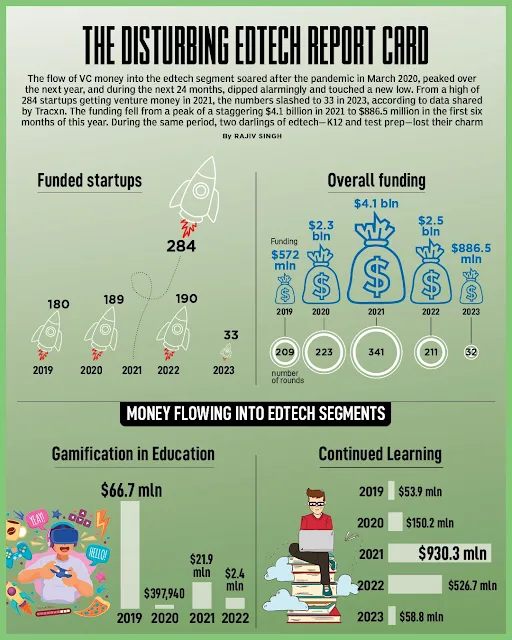Status of Indian Education Tech Startups
The Indian Edtech landscape has experienced a seismic shift in recent years, marking both remarkable achievements and daunting challenges. From 2014 to 2021, the sector witnessed an unprecedented surge, with over 4450 education startups in India raising a whopping $4.7 billion. Among these, Byju's emerged as a dominant force, securing a staggering 65% of the total funding, underscoring its pivotal role in revolutionizing the educational technology sphere.
Pandemic Disruption: Shift to Online Learning
However, the trajectory of Edtech took a momentous turn with the onset of the pandemic in 2020. As schools shuttered their doors, students flocked to online platforms like Byju's, Unacademy, and Vedantu, seeking an alternative to traditional classroom learning. This surge in demand led to a frantic rush for digital enrollment, attracting substantial investments from forward-thinking investors who foresaw technology's transformative potential in shaping the future of education.
Byju's Expansion and Marketing Splurge
Amid this fervor, Byju's spearheaded a bold expansion strategy, investing a staggering $2 billion in acquiring various Edtech firms. Notably, these acquisitions included prominent names like Whitehat Jr, Aakash, Toppr, Epic, and Great Learning. Byju's also adopted an aggressive marketing approach, roping in globally renowned personalities such as Shah Rukh Khan and Lionel Messi as brand ambassadors. Furthermore, strategic sponsorships, including becoming the primary sponsor of the Indian Cricket Team and the official sponsor of the 2022 FIFA World Cup, were pivotal in enhancing the brand's visibility and influence.
The company began to face criticism on aggressive sales tactics manipulating the parents to convince their children was struggling in academics. The accumulating allegations, liquidity crunch, loss of trust from auditors, legal trouble, dilution of education service provider to selling company pushed them into crises.
The Decline and Challenges
Despite this initial euphoria, the Edtech sector encountered significant hurdles. The exorbitant cost of customer acquisition through intensive marketing, unrealistic pricing models, shifting dynamics in school integration, and a decline in global venture capital posed formidable challenges. Consequently, the exponential growth witnessed during the pandemic era subsided, leading to a dip in revenue and slower market expansion.
The Fallout: Shutdowns and Layoffs
The fallout from these challenges was palpable, as several Edtech startups struggled to sustain themselves. Lido, Udayy, Crejo.Fun, Superlearn, and Qinl faced closure due to a dearth of funds, while industry giants like Unacademy and Vedantu were compelled to lay off hundreds of employees to navigate the stormy market conditions.
Struggles of Unicorns and Layoffs
Even established unicorns in the sector faced their share of setbacks. Physics Wallah achieved unicorn status but had to implement job cuts affecting over a hundred employees. Since 2022, a staggering number of layoffs—amounting to 14616 employees—have been recorded across 24 Indian Edtech startups, including six unicorns.
The challenges persisted as profitability remained elusive for the majority of Edtech unicorns. Aggressive spending on advertising, promotions, and high-cost sales executives resulted in substantial losses for key players like Unacademy, Vedantu, Eruditus, and upGrad.
Future Prospects and Edtech's Role
Yet, amidst these adversities, the potential of Edtech remains undeniable. It continues to play a crucial role in bridging learning gaps, offering affordable skill-based courses to students in tier 2 and 3 cities, aiding institutions lacking digital infrastructure, and facilitating career advancements for professionals.
In conclusion, the future of Indian Edtech hinges on adaptive strategies that balance sustainable growth with addressing the evolving needs of learners, institutions, and job seekers. While challenges persist, the transformative potential of Edtech in reshaping the educational landscape remains a beacon of hope for a future where learning knows no bounds.














Social Plugin